| Srl | Item |
| 1 |
ID:
142624


|
|
|
|
|
| Summary/Abstract |
This article explores the interplay between international donors and local NGOs in Kyrgyzstan's HIV/AIDS sector. It argues that donors have transposed ready-made policies without sufficient consideration of the local context and that NGOs have responded strategically, adapting their proposals and reports to the expectations of donors. This complex interplay has resulted in unintended consequences that have undermined an effective response to the HIV/AIDS epidemic. It has given rise to ‘virtual realities’ detached from developments on the ground. The funding system has also led to corruption and misappropriation of funds and the failure of NGOs to become sustainable. Largely bypassing the state in the allocation of funds, international donors have also undermined an already weak state.
|
|
|
|
|
|
|
|
|
|
|
|
|
|
|
|
| 2 |
ID:
142626


|
|
|
|
|
| Summary/Abstract |
This article conducts a comparative analysis of a catastrophic flood that hit the Kulob region of southern Tajikistan in 2010, and the government of Tajikistan's campaign to gather money to build the Roghun dam and hydropower station. It advances the notion of ‘everyday disasters’ in order to explain the imprecise boundaries between major catastrophic events and more mundane dimensions of the everyday as experienced by residents of Kulob. The article seeks to shed light, firstly, on the processes that underpin both Kulob residents’ experiences of stagnation and the normalization of non-development, and, secondly, on the ways in which Kulob residents joke and ‘do’ cunning/cheating whilst dealing with disastrous events in order to cultivate an everydayness that is worth living.
|
|
|
|
|
|
|
|
|
|
|
|
|
|
|
|
| 3 |
ID:
142619
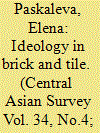

|
|
|
|
|
| Summary/Abstract |
This study analyses the impact of politics on urban development and, in particular, on Timurid heritage in present-day Uzbekistan. It outlines the problem of landscape manipulation for the advancement of a political ideology. After presenting a brief overview of Tsarist and Soviet restoration practices, the article focuses on the post-Soviet nation-building schemes through public iconography, urban renewal measures and heritage construction. Architectural and epigraphic restorations of Timurid monuments in Samarqand and new constructions in Tashkent provide a valuable illustrative framework. As world heritage sites, the Samarqand monuments are examined both in their historical and current socio-political contexts; the role of UNESCO is also analysed. The study benefits from and contributes to critical heritage studies and urban development as a narrative of power-making and relational space.
|
|
|
|
|
|
|
|
|
|
|
|
|
|
|
|
| 4 |
ID:
142620
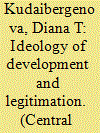

|
|
|
|
|
| Summary/Abstract |
The paper analyses the multifaceted discourse of development and nation-building in post-Soviet Kazakhstan. It addresses the regional clan–central elite relations and Nursultan Nazarbayev regime's legitimating agenda through the Kazakhstan 2030 Strategy for development. The economic developmental component in Nazarbayev's ideological discourses is primarily an exercise of control over regional economic and political elites and that helped building further legitimacy for the regime in various socio-ethnic constituencies on both the regional and central levels. Kazakhstan 2030 was deployed by the regime to substitute the Soviet version of ideology, legitimize the regime among various ethno-lingual audiences, and discipline the behaviour of regional elites. The paper shows how the study of elites’ interests can best explain the nature of national ideology and development projects.
|
|
|
|
|
|
|
|
|
|
|
|
|
|
|
|
| 5 |
ID:
142618
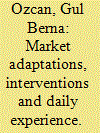

|
|
|
|
|
| Summary/Abstract |
This special issue illuminates diverse realities of post-Soviet development in Central Asia through a multidisciplinary prism. The contributing articles are grounded in a range of social science disciplines including architecture, anthropology and geography, as well as drawing from mainstream social sciences. The analyses demonstrate how a synthesis of specialist knowledge from area studies and individual disciplinary methodologies can provide well-grounded critical positions on development.
|
|
|
|
|
|
|
|
|
|
|
|
|
|
|
|
| 6 |
ID:
142625
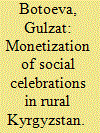

|
|
|
|
|
| Summary/Abstract |
This article focuses on the embeddedness of hashish production in the local economy of Toolu, a village in Kyrgyzstan. It explores how transformations in social relationships and the monetization of gift giving put constant pressure on families to find cash in a semi-subsistence agricultural economy. Although not produced on an industrial scale in the community, hashish is used as a cash crop in times of deficit. Based on a mixed-methods study combining ethnographic fieldwork with survey data, I show how the hashish economy is intertwined with different forms of reciprocal relationships based on gift-giving practices and the monetization of social relationships. In doing so, I illustrate how the hashish economy is embedded in local livelihoods and shapes emerging forms of economic morality in Kyrgyz society.
|
|
|
|
|
|
|
|
|
|
|
|
|
|
|
|
| 7 |
ID:
142623
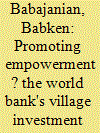

|
|
|
|
|
| Summary/Abstract |
This article examines the extent to which the World Bank's community-driven Village Investment Project empowered people to influence the choice of local investments (micro-projects) and to exact accountability from their leaders. It is based on qualitative interviews and group discussions in 16 rural communities. The research demonstrates that the project provided an effective mechanism for responsive infrastructure delivery to address local priority needs. However, it did not improve accountability either within or outside the micro-project boundaries. The project's bottom-up development model was not by itself sufficient to enable people to exercise power over local government officials and informal leaders in the absence of effective horizontal accountability institutions within the state.
|
|
|
|
|
|
|
|
|
|
|
|
|
|
|
|
| 8 |
ID:
142621


|
|
|
|
|
| Summary/Abstract |
This paper explores the evolution of Kazakhstan's development through an analysis of population trends, infant mortality, air emissions, water management, oil production, income, cost of living and average salary. The longitudinal data analysis demonstrates that the development of Kazakhstan during the Soviet period was far from sustainable in terms of uncontrolled environmental pollution. Time-series analysis illustrates that the 1990s transition to the market economy temporarily eased environmental degradation but also brought about initial socio-economic disarray and decline in living standards. Further support for rural areas and economic diversification is needed to move away from Kazakhstan's heavy reliance on mineral resource extraction to a more sustainable path of development.
|
|
|
|
|
|
|
|
|
|
|
|
|
|
|
|
| 9 |
ID:
142622


|
|
|
|
|
| Summary/Abstract |
The article looks at Uzbekistan's political economy from the perspective of a logic of appropriateness, an approach that takes rules to be the underlying principle of action. The rules are mostly in line with a ‘spirit’ of self-reliance (mustaqillik), which has shaped Tashkent's international engagement since independence. From the perspective of those rules, the article reveals some important features of Russian–Uzbek relations, particularly the difficult and often tense negotiations over the future of the Tashkent Aviation Production Association (TAPOich). Self-reliance and the rules by which it was comprised were not, in the end, conducive to long-term cooperation with Russia in the aviation sector, where collaboration was first and foremost necessary.
|
|
|
|
|
|
|
|
|
|
|
|
|
|
|
|